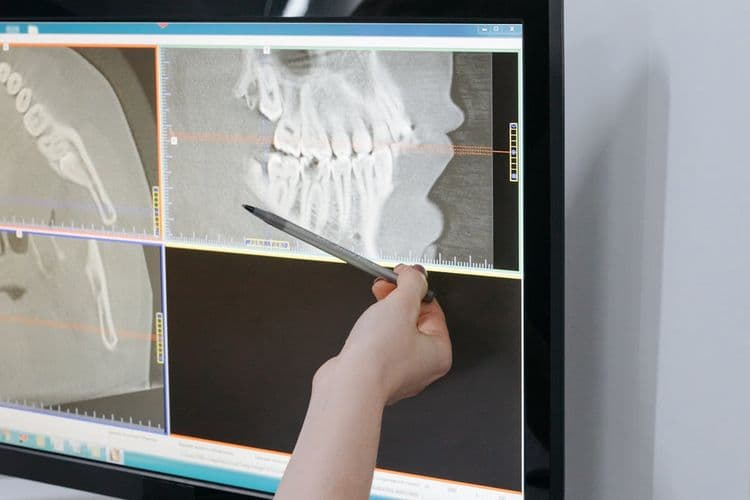The treatment for Temporomandibular Joint (TMJ) disorders, a condition affecting the jaw joint and muscles controlling jaw movement, is multifaceted and dependent on the severity of individual symptoms. While some patients find relief through lifestyle modifications and non-prescription remedies, others may require more advanced medical intervention. However, the question that remains is - how does one determine the best course of treatment for TMJ disorders? Let’s explore this complex subject further.
Understanding TMJ Disorder
Temporomandibular Joint Disorder, more commonly known as TMJ Disorder, is a complex condition affecting the joint that connects the jaw to the skull. The causes of TMJ are multifaceted, often rooted in physical strain on the joint due to clenching or grinding of teeth, jaw injury, or arthritis. Stress and anxiety can further exacerbate these physical factors. In addition, misalignment of teeth or jaw can result in TMJ disorder. TMJ diagnosis involves a thorough examination of the jaw, including a review of the patient’s medical history and a physical examination of the mouth and jaw. Imaging tests such as X-rays, CT scans, or MRI may also be used to provide an extensive view of the joint’s condition.
Identifying TMJ Symptoms
After a thorough understanding of TMJ disorder, one must be able to recognize the symptoms associated with this condition. The most common indicators of this disorder include jaw clicking and facial pain. Jaw clicking is not always a cause for concern, but when accompanied by other symptoms, it can be indicative of TMJ disorder. This clicking can be audible or just felt, and it may also be associated with a grating sensation. Facial pain, on the other hand, is often chronic and may extend to the neck and shoulders. It can be aggravated by jaw movement such as chewing, speaking, or even yawning. It is crucial to understand that these symptoms may vary in severity and frequency, requiring professional intervention for accurate diagnosis.
Home Remedies for TMJ
In the domain of TMJ treatments, there exists a variety of home remedies that can provide relief. To fully appreciate their effectiveness, it’s essential to initially comprehend the nature of TMJ disorder. Subsequently, we will explore natural techniques for alleviating TMJ symptoms, as well as proven herbal remedies that have shown promise in addressing this condition.
Understanding TMJ Disorder
Often referred to as the hinge that connects your jaw to the temporal bones of your skull, the temporomandibular joint (TMJ) plays a pivotal role in basic talk and chew functions. When this joint is injured or damaged, it can lead to a localized pain disorder known as TMJ disorder. The causes of TMJ are multifaceted, ranging from genetics, arthritis, jaw injury, to even excessive tooth grinding. Symptoms can include pain or tenderness in your jaw, aching pain in and around your ear, difficulty chewing or discomfort while chewing, and aching facial pain. A TMJ diagnosis is typically confirmed by a healthcare professional using a combination of physical examination, patient history, and if necessary, imaging tests. Understanding TMJ disorder is fundamental in seeking appropriate treatment.
Natural TMJ Relief Techniques
Recognizing the complexities of TMJ disorder paves the way to understanding various relief options, including natural techniques that can be performed at home. One such technique is the use of acupressure, a traditional Chinese medicine discipline that involves the application of pressure to certain points on the body to alleviate pain. Acupressure techniques have been shown to provide significant TMJ relief by reducing muscle tension. Essential oils, such as lavender and peppermint, can also be effective in managing TMJ symptoms when massaged gently into the jaw area. These oils possess anti-inflammatory and analgesic properties which can help relax the muscles and alleviate pain. Remember, these home remedies should be used in conjunction with, not as a replacement for, professional medical advice.
Proven Herbal Remedies
Have you ever considered the power of herbs in treating TMJ disorders? Herbal supplements have proven efficacy in alleviating pain and reducing inflammation associated with this condition. For instance, turmeric, renowned for its potent natural anti-inflammatory properties, may help decrease joint inflammation and provide relief from TMJ symptoms. Similarly, chamomile, an herb widely employed for its calming and anti-inflammatory effects, can also be beneficial. Herbal supplements like these can offer a non-invasive, natural way to manage TMJ disorders. It’s essential, however, to consult with a healthcare provider before starting any herbal regimen to guarantee safety and compatibility with any existing treatments. With the right guidance, herbal remedies can be an effective part of your TMJ treatment plan.
Lifestyle Changes to Alleviate TMJ
Shifting now to the role of lifestyle changes in TMJ treatment, stress management techniques, dietary modifications, and corrective sleep habits emerge as pivotal factors. The intricate relationship between these lifestyle alterations and the alleviation of TMJ symptoms is worth exploring. A detailed examination of these elements can offer a thorough understanding of non-invasive, self-directed strategies for managing TMJ.
Stress Management Techniques
Implementing stress management techniques can greatly contribute to the alleviation of Temporomandibular Joint Disorder (TMJ) symptoms. Breathing exercises, for instance, can help reduce muscle tension and promote relaxation, which in turn, may lessen TMJ discomfort. Deep, controlled inhales and exhales can calm the nervous system, reducing stress and anxiety that often exacerbate TMJ symptoms.
Beyond breathing exercises, mindfulness meditation is another effective tool. This practice encourages a focused awareness on the present moment, helping to dissipate stress and improve mental clarity. Regular mindfulness meditation can help individuals gain better control over their response to stress, thereby potentially reducing the frequency and severity of TMJ flare-ups.

Dietary Modifications
While it may not seem immediately apparent, making dietary modifications can play a significant role in alleviating the symptoms of Temporomandibular Joint Disorder (TMJ). Consuming soft foods, such as mashed potatoes, scrambled eggs, or smoothies, can help to minimize jaw strain and discomfort. These food items require less chewing effort and consequently, reduce the stress on the jaw joint. Furthermore, maintaining proper hydration is not just important for overall health but also for preventing TMJ symptoms. Insufficient hydration can lead to muscle cramping, including the jaw muscles, potentially exacerbating TMJ symptoms. Therefore, regular intake of water is essential. By incorporating these dietary changes, TMJ patients can manage their symptoms more effectively.
Corrective Sleep Habits
In order to alleviate the symptoms of TMJ, adopting corrective sleep habits can be highly beneficial. Your sleep posture plays a notable role in this respect. A neutral position, where the head and neck are aligned, reduces jaw tension and strain, mitigating TMJ discomfort. Incorporating an adequate pillow support can help maintain this alignment throughout the night. Equally important are consistent nighttime routines. A soothing pre-sleep ritual, such as quiet reading or a warm bath, can initiate relaxation and decrease muscle tension, including in the jaw area. Avoiding caffeine and electronic screens close to bedtime can also promote a better sleep quality. Over time, these corrective sleep habits can considerably contribute to TMJ symptom relief.
Over-the-Counter Medications for TMJ
Though TMJ disorders often require medical intervention, there are several over-the-counter (OTC) medications available that can help alleviate the discomfort and inflammation associated with this condition.
OTC painkillers, such as ibuprofen and acetaminophen, are typically the first line of defense. They work by reducing inflammation and providing temporary relief from pain. Some patients also find relief with topical analgesics, which can be applied directly to the jaw to numb the pain.
Muscle relaxants can also be beneficial for some patients. While prescription strength muscle relaxants are often necessary, over-the-counter options can provide temporary relief.
The most commonly used OTC medications for TMJ include:
- Nonsteroidal anti-inflammatory drugs (NSAIDs)
- Topical analgesics
- OTC muscle relaxants
Each of these options has its own benefits and potential side effects, which should be considered before use.
Prescription Treatments for TMJ
Despite the effectiveness of over-the-counter medications in providing temporary relief from TMJ discomfort, there are instances where they fall short, necessitating the use of prescription treatments. For ideal pain management, doctors may prescribe powerful non-steroidal anti-inflammatory drugs (NSAIDs), such as ibuprofen, which are stronger versions of over-the-counter varieties. In cases where TMJ causes severe muscle tension or spasms, muscle relaxants may be utilized. They work by reducing muscle contractions, and so alleviating pain and discomfort. Other prescription treatments may include tricyclic antidepressants, primarily used for pain relief, and corticosteroids, to reduce inflammation. The selection of a prescription treatment is typically based on the patient’s specific symptoms, overall health, and response to prior treatments.
Advanced Surgical Treatments for TMJ
While most cases of TMJ can be managed using less invasive treatments, there are instances where these measures are insufficient, necessitating advanced surgical interventions.
The surgical options available depend on the severity of the TMJ disorder. These may include:
- Arthroscopy: A minimally invasive procedure where an arthroscope is inserted into the joint through a small incision.
- Arthrocentesis: A procedure that involves the insertion of needles into the joint to remove debris and inflammatory byproducts.
- Open-joint surgery: This is only performed in severe cases where the joint needs to be repaired or replaced.
The recovery process varies from patient to patient, and is dependent on the nature of the surgery performed. Complete recovery may take weeks to months, and will require adherence to post-operative instructions to guarantee ideal outcomes.
Maintaining a TMJ-friendly Lifestyle
In order to manage TMJ disorder effectively, maintaining a TMJ-friendly lifestyle is paramount. This involves integrating gentle exercise routines into your daily regimen. These exercises, specifically designed for TMJ sufferers, help to strengthen the jaw muscles, alleviate pain, and improve joint function.
Additionally, incorporating relaxation techniques, such as deep breathing, mindfulness, and yoga, can help manage stress levels, a known trigger for TMJ disorder. These techniques not only promote overall well-being but also aid in the reduction of jaw tension, thereby mitigating TMJ symptoms.
Frequently Asked Questions
Can TMJ Disorder Cause Hearing Loss?
Yes, TMJ disorder can potentially cause hearing loss. This happens as a result of jaw tension impacting the inner ear, leading to various hearing symptoms, such as tinnitus or even substantial hearing impairment.
Is TMJ Disorder Hereditary?
While it’s not strictly hereditary, genetic factors can influence the likelihood of developing TMJ disorder. A family history of the condition may increase one’s risk, indicating a potential genetic predisposition.
How Does Stress Impact TMJ Disorder?
Stress can exacerbate TMJ disorder by intensifying muscle tension in the jaw. Effective stress management and anxiety relief strategies can greatly reduce these symptoms, improving overall condition and quality of life for affected individuals.
Can Acupuncture Be Used as a Treatment for TMJ?
Yes, acupuncture can be utilized for TMJ disorders. Acupuncture benefits include its natural approach and potential for significant pain relief, making it a valuable therapeutic option, particularly for patients seeking non-pharmacological interventions.
Can TMJ Disorder Affect Pregnancy?
Yes, TMJ disorder can potentially affect pregnancy. TMJ symptoms during pregnancy may be exacerbated due to hormonal changes. In addition, pregnancy can impact dental health, potentially worsening existing TMJ conditions.


